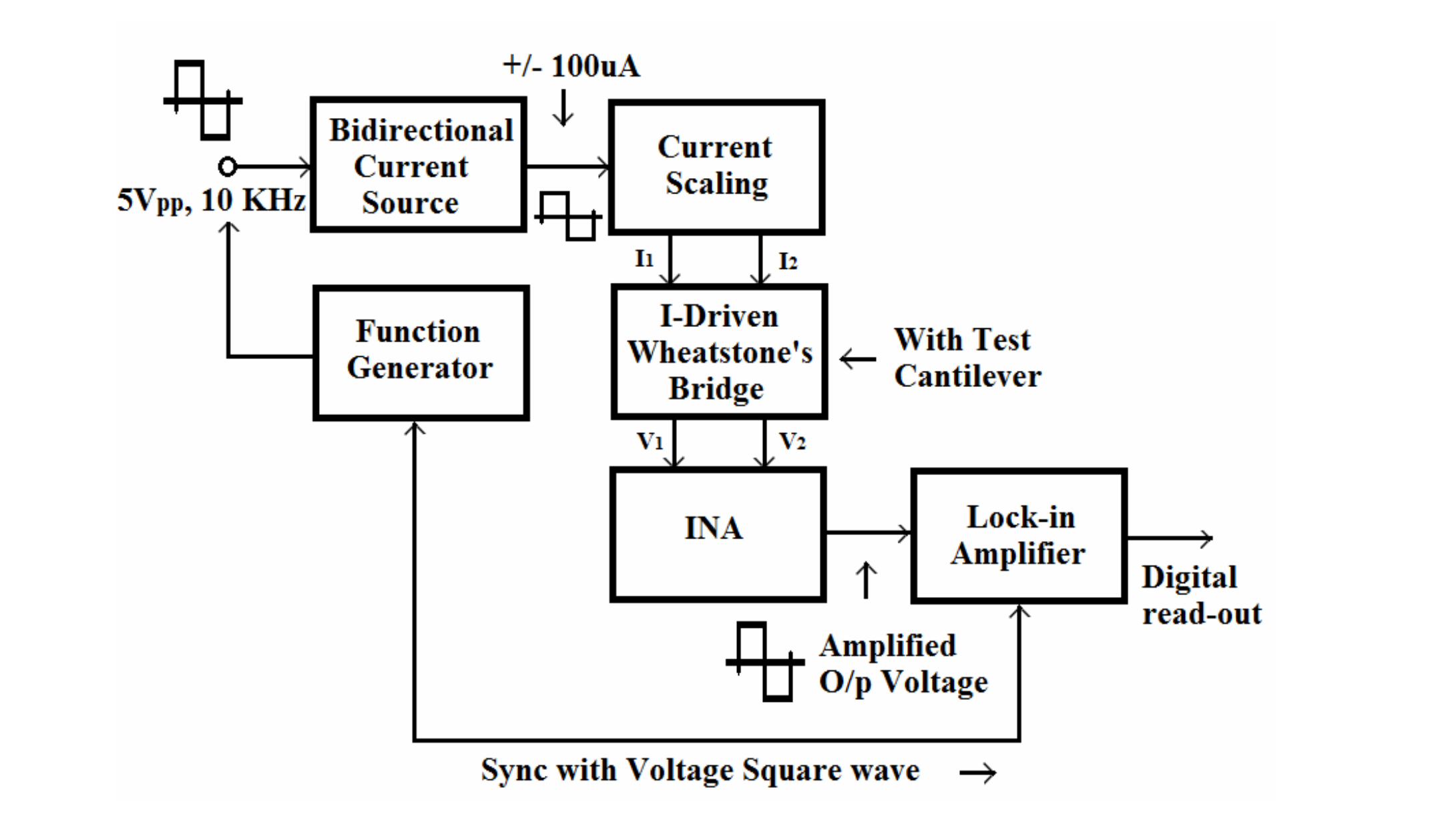This invention introduces an AC current driven open-bridge configuration designed for high-precision measurement of impedance variations in sensors, particularly piezo-resistive types. By replacing conventional voltage excitation with identical low-amplitude AC currents in a dual half-bridge setup, the system achieves output voltages directly proportional to sensor impedance changes, enabling superior sensitivity and significantly lower power consumption. Integrated with an instrumentation amplifier and lock-in amplifier, the system effectively filters out noise and offsets, delivering high-resolution outputs with zero linearity error. The design has demonstrated the ability to detect variations as small as 40 parts per billion, making it highly suitable for applications in explosive detection, environmental sensing, biomedical diagnostics, and industrial monitoring.
Measuring extremely small impedance variations in piezo-resistive or similar sensors remains challenging due to limitations in sensitivity, power efficiency, and noise interference in conventional Wheatstone bridge-based systems. DC excitation-based systems consume high power and are sensitive to mismatches and noise, while traditional signal conditioning circuits struggle with resolution and linearity at sub-ppm levels.
- Open-Bridge AC Current Excitation: The invention uses an AC current driven open-bridge configuration instead of traditional voltage-driven Wheatstone bridges, enabling direct measurement of small impedance or resistance changes without offset errors.
- Improved Sensitivity and Power Efficiency: The output voltage is directly proportional to the excitation current and impedance variation, which reduces power consumption significantly—up to 8 times lower than conventional Wheatstone bridges for equivalent performance.
- High Resolution and Linearity: The circuit achieves zero linearity error and resolves variations as small as 40 parts per billion (ppb), outperforming existing systems with 0.5% error and limited resolution.
- Instrumentation and Lock-In Amplifier Integration: The system integrates a high-gain instrumentation amplifier and lock-in amplifier to extract signals at the excitation frequency, effectively filtering out thermal and environmental noise and improving the signal-to-noise ratio (SNR).
- Wide Sensor Compatibility and Application Flexibility: The design is compatible with any resistive or impedance-based sensor and has demonstrated effectiveness in chemical sensing, including detection of TNT and RDX using piezo-resistive microcantilevers.
The prototype consists of an AC current driven open-bridge system configured with two identical excitation currents sourced from an AC voltage generator via current scaling modules. Three different base resistances (100kΩ, 330kΩ, and 470kΩ) were tested using variable resistors and piezo-resistive sensors, with excitation currents ranging from 0.1 µA to 1 µA. The system includes a lock-in amplifier to filter frequency-specific signals and display output voltages in millivolts after amplification. The setup was tested across various temperatures and proved capable of detecting changes with resolutions as low as 0.3 ppm. Real-world validation with chemical vapors demonstrated the ability to detect 40 ppb changes in gas concentration using micro-cantilevers, confirming its high resolution and robustness in practical scenarios.
An AC current-driven open-bridge configuration for high-precision impedance measurement is at the complete specification stage, demonstrating sub-ppm sensitivity and practical testing with piezo-resistive sensors, indicating advanced development suitable for real-world applications.
4
This technology significantly enhances the resolution and efficiency of sensor-based measurement systems. Its ability to detect ultra-small changes in impedance at extremely low power makes it ideal for applications in healthcare diagnostics, environmental sensing, explosives detection, and precision instrumentation. By overcoming limitations of traditional analog front ends, this system can improve sensor integration in next-generation electronics.
- Chemical and Explosive Detection
- Biomedical Sensing
- Smart Wearables
- Environmental Monitoring
- Industrial IoT and Condition Monitoring
- Aerospace and Defence Sensing Applications
Geography of IP
Type of IP
2205/MUM/2011
382558

